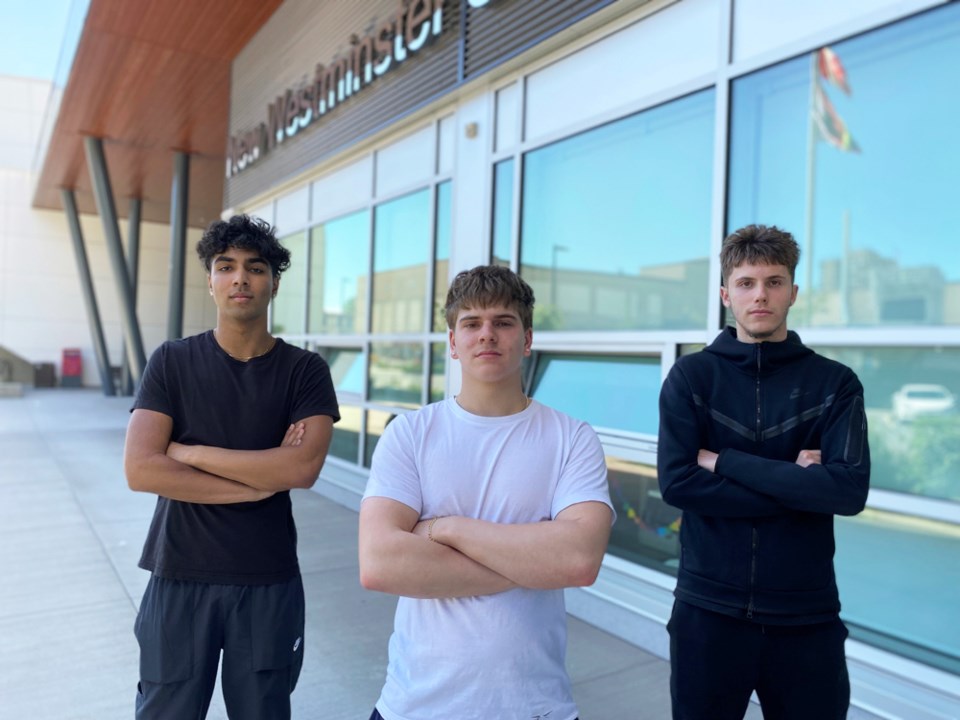Sartaj Malhi, Tyler Cacchione and Stefan Stojanovic are on a mission to help combat drug abuse among teens.
No, they’re not counsellors or drug experts or teachers. They’re students themselves, winding up their Grade 11 year at New Westminster Secondary School, and they hope their peer-to-peer message resonates in a way traditional anti-drug education hasn’t always managed to do.
The NWSS trio have set up a new organization called FUTUR3 Foundation. Their aim? To stop drug abuse before it starts by arming middle-school students with the information they need to make good choices.
The trio say they’ve seen too many younger students arrive at the high school and end up with bad experiences because of the easy access to three common “gateway drugs”: vaping, weed and alcohol.
“We really saw the effects that it had on bright, bright students that had good academic futures or good athletic futures,” Stojanovic said. “And we really wanted to take it upon ourselves to create a difference, to create a change in our school system, and to have a peer view.”
The three have created a classroom presentation for middle-school students, which they’ve taken to two classes at Fraser River Middle School and will take to Queensborough Middle School on Monday. They’re also spreading awareness on social media.
They share information about what drugs middle-school kids may encounter when they hit the high school, how they can keep themselves safer, and, in the bigger picture, how the choice to use drugs can impact their future. They want to help kids understand the dangers of drugs — not just the possibility of overdose, but also how drug use can take away their motivation and derail their chance for future success.
“Our goal is for students to be successful,” Stojanovic said. “You don’t want anyone to feel bad or shamed that they do anything like that. We just really want to help everyone coming into the high school. We want them to be successful in their idea of what success is.”
They say they’ve been around plenty of drug use themselves at social events. Beyond the three they list as common gateway drugs, there are also common “party drugs” like cocaine, Molly (MDMA), mushrooms and acid.
For some kids, it’s not a big deal. They’ll go to a party, use drugs a time or two, and move on with their lives. For others, it becomes a problem — and those are the students the trio hopes their message will help.
No stigma: Peers offer non-judgmental support for students
“Our whole goal is, we don’t want to stigmatize anybody for using drugs,” said Malhi.
“We just want people to find better alternatives,” added Cacchione.
Cacchione believes stress is the number 1 reason why kids start using drugs in high school.
“Every kid here is so stressed out. They have family problems, school problems, relationships, peers, friends, right? And this is how they’re coping with it. I would say marijuana is the number 1 coping mechanism in schools in B.C.,” Cacchione said. “And what happens is they smoke to feel better, and then the cycle just repeats itself. And then it gets to a point where their body’s relying on it. There’s kids through school that can’t go to sleep every night unless they smoke weed.”
That’s not intended as judgment, just fact.
Malhi’s quick to point out the three aren’t trained to deal with other teens’ mental health problems. What they can do, though, is become familiar faces for the younger students so those kids know where to go for non-judgmental support when they need it — and Malhi, Cacchione and Stojanovic can steer them to the counsellors, youth workers and other supports that are already available.
“Usually those kids wouldn’t talk to their parents. They’ll be too scared to talk to their teachers. So I think peers will be definitely safe for them,” Malhi said.
With this school year nearly over, the three now have their sights set on September. They’re hoping to be able to grow their social media presence and become more involved in presentations next year — for other classrooms, youth groups and community organizations that would welcome peer-to-peer substance use awareness sessions.
“Any partnership, we would love to do it,” Malhi said. “Because we’re students, we’re peers. We know what happens. And I think we could really help the adults out.”
Anyone interested in arranging a presentation or working with FUTUR3 Foundation can contact them via Instagram or email.
Follow Julie MacLellan on Twitter @juliemaclellan.
Email Julie, [email protected].



